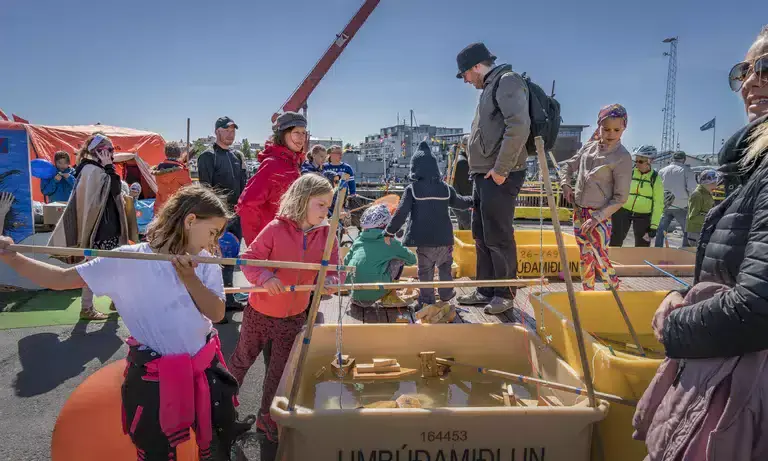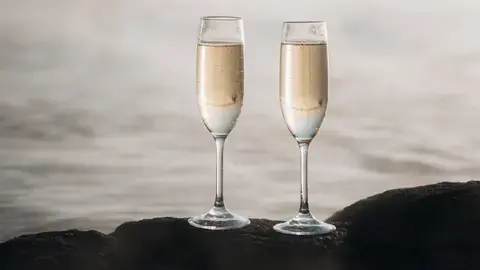
Ten Quirky and Beloved Icelandic Traditions
Iceland is renowned for its stunning landscapes, mesmerizing Northern Lights, and dynamic culture. However, what makes the country even more delightful are its unique traditions—especially the remarkable celebrations that unfold throughout the year. Whether it is indulging in cream buns or marking the arrival of summer in April, these customs offer a captivating glimpse into Iceland’s rich heritage and distinctive character.
1. Bóndadagur (Husband’s Day) – Celebrating Icelandic Men
Celebrated: The first day of the old Norse month of Thorri (late January)
Tradition: Women give gifts and pamper the men in their lives
Bóndadagur, or "Husband's Day," is the counterpart to Konudagur (Women's Day). Rooted in ancient Norse traditions, it was originally a day for husbands and men of the household to step outside, barefoot, wearing only a shirt, and welcome the month of Thorri. Today, it's a day when women show appreciation for their partners, often by preparing a special meal, giving gifts, or surprising them with acts of kindness.
2. Konudagur (Women’s Day) – A Day for Honoring Women
Celebrated: The first Sunday after February 18
Fun Fact: It’s the counterpart to Bóndadagur (Husband’s Day).
Konudagur, or Women’s Day, is a special day dedicated to honouring women. This cherished Icelandic tradition, steeped in history and folklore, is a delightful celebration of women and the promise of spring. The tradition dates back to the old Norse calendar and is still celebrated in modern times. Historically, it marked the arrival of longer days and the renewal of life, making it an important moment in Icelandic culture. On this day, men typically give flowers, gifts, or small tokens of appreciation to the women in their lives. Families and communities also take the opportunity to come together, reflecting on the importance of women in society.
Along with Bóndadagur, Konudagur is often considered Iceland’s version of Valentine’s Day, where couples celebrate and appreciate their spouses through acts of love and kindness. It’s a lovely Icelandic tradition that highlights gender appreciation in a unique and heartfelt way.

3. Bolludagur (Cream Bun Day) – The Sweetest Holiday
Celebrated: The Monday before Ash Wednesday
Traditional Food: Choux pastry filled with cream and jam, topped with chocolate
Bolludagur marks the beginning of Lent, and Icelanders celebrate it in the best way possible — by eating delicious cream buns! Children traditionally make "bolluvendir" (bun wands) and playfully hit their parents while shouting “Bolla! Bolla!” to earn more buns. Bakeries across Iceland prepare thousands of variations, making it a highly anticipated day for food lovers.
4. Sprengidagur (Explosion Day) – A Feast Before Fasting
Celebrated: The Tuesday before Ash Wednesday
Traditional Food: Salted lamb with split pea soup
Sprengidagur, or “Explosion Day,” is all about eating to the point of bursting! It’s a day of indulgence before the traditional fasting period of Lent. The main dish is saltkjöt og baunir (salted meat and pea soup), which has been a staple of Icelandic cuisine for centuries.
5. Öskudagur (Ash Wednesday) – Iceland’s Version of Halloween
Celebrated: 40 days before Easter
Tradition: Kids dress up in costumes and sing for candy
Unlike other countries where Ash Wednesday has religious significance, Iceland turns it into a fun-filled day for children. Kids dress up in costumes, visit shops, and sing in exchange for sweets—similar to trick-or-treating. It's a lively and joyous celebration that marks the end of Iceland’s pre-Lenten festivities.

6. Sumardagurinn fyrsti (First Day of Summer) – Celebrating Warmth in April
Celebrated: The first Thursday after April 18
Fun Fact: It often snows on this day!
Icelanders officially welcome summer in April, even if it's still freezing outside. Rooted in the old Norse calendar, Sumardagurinn fyrsti was a time to celebrate the changing seasons. People participate in parades, outdoor activities, and family gatherings, symbolizing hope and renewal.
7. Sjómannadagurinn (Fishermen’s Day) – Honoring Iceland’s Fishermen
Celebrated: The first Sunday of June
Tradition: Coastal towns hold festivals, rowing competitions, and events
The Icelandic Fishermen's Day, Sjómannadagurinn, celebrates the country's rich maritime heritage. The day is packed with activities for all ages at both the Old Harbour in Reykjavík and Hafnarfjörður Harbour, ensuring a memorable experience for attendees.
Fishermen's Day, or Sjómannadagurinn, has a deep historical significance in Iceland, rooted in the country's strong maritime heritage. Traditionally celebrated on the first Sunday of June, this day honours the vital role of fishermen in Icelandic society.
The tradition began on June 6th, 1938, recognizing the contributions of fishermen who braved the North Atlantic's perilous waters to sustain the nation. These celebrations underscore the importance of the fishing industry, which has been a cornerstone of Iceland's economy and culture for centuries. Fishermen's Day is a tribute to the courage, hard work, and resilience of fishermen, past and present, whose efforts have shaped Iceland's identity and prosperity.
Each year, the day brings together communities with parades, performances, sea rescue demonstrations, and various family-friendly activities, reinforcing the bond between the people and the sea.
8. Verslunarmannahelgi (Merchants' Holiday) – The Biggest Party Weekend
Celebrated: First weekend of August
Fun Fact: You are sure to find a festival to your liking all over the country
Originally a holiday for shopkeepers, this long weekend has turned into the biggest festival weekend of the year. People travel across Iceland to attend music festivals, camping events, and parties. The most famous celebration, Þjóðhátíð, takes place in the Westman Islands, attracting thousands for bonfires, singing, and fireworks.
In Reykjavík, the Innipúki Festival offers an alternative way to celebrate for those who prefer to stay indoors. The festival, whose name translates to "Indoor Demon," features a lineup of local musicians, DJs, and performances in an intimate venue setting. It has become a popular choice for people who want to experience a vibrant cultural scene without the rugged camping experience of other festivals.
9. Jólabókaflóð (Christmas Book Flood) – A Bookworm’s Dream
Celebrated: December 24
Tradition: Giving books as gifts on Christmas Eve and reading them with hot chocolate
Icelanders have a deep love for literature, and Jólabókaflóð reflects this passion. The weeks leading up to Christmas, is the biggest publication time for Icelandic books, as new releases flood the market. Families exchange books on Christmas Eve, then spend the night reading and eating Icelandic chocolates. This tradition dates back to World War II when paper was one of the few available commodities, leading to a lasting cultural emphasis on book-giving. The excitement surrounding Jólabókaflóð is felt throughout the country, as bookstores become bustling hubs of literary discovery and booklists are eagerly anticipated by readers of all ages.
10. Þrettándinn (Twelfth Night) – The Official End of Christmas
Celebrated: January 6
Tradition: Bonfires, fireworks, and folklore about elves
Þrettándinn marks the final farewell to Christmas with bonfires, fireworks, and traditional folktales. According to Icelandic belief, elves and supernatural beings become more active on this night, making it a mystical and magical occasion.
A Year Full of Festivities
Icelandic traditions offer a fascinating glimpse into the country's history, culture, and way of life. Whether it’s enjoying cream buns, honouring fishermen, or reading books by the fire, these celebrations reflect Iceland’s strong sense of community and heritage.
If you’re ever in Iceland during one of these special days, be sure to join the fun and experience the local customs firsthand!